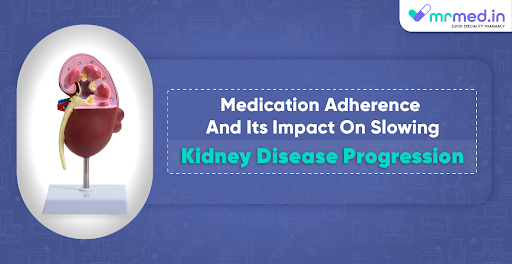Millions of individuals worldwide suffer from chronic kidney disease (CKD), characterised by a progressive decrease in kidney function over time. Finding efficient methods to halt its spread has become crucial due to its sneaky nature and potential for significant problems. Medication adherence stands out among these tactics as a crucial element that greatly affects how CKD develops. In this article, we explore the complex link between medication adherence and the advancement of kidney disease, emphasising the significance of adhering to recommended therapies to protect kidney health.
Understanding Chronic Kidney Disease
A gradual disorder, chronic kidney disease develops over months or even years and sometimes goes unnoticed until it is well advanced. It is characterised by a slow deterioration in kidney function, which makes the kidneys less able to efficiently filter waste materials and extra fluid from circulation. Diabetes, hypertension, autoimmune diseases, and genetic susceptibility are some of the causes that cause CKD. End-stage renal disease (ESRD), which requires dialysis or a kidney transplant to survive, can result from untreated CKD.
The Role of Medications in CKD Management
Pharmacotherapy is essential in managing CKD by addressing underlying causes, treating symptoms, and avoiding complications. Central to CKD treatment regimens are medicines that lower proteinuria, manage blood sugar, treat anemia, and lower blood pressure. They lessen the strain on the kidneys and decrease the disease's course, which enhances patients' quality of life and lowers the risk of complications.
The Link between Medication Adherence and CKD Progression
The degree to which patients adhere to their recommended treatment plans, including taking medicines as directed, following dose schedules, and making appropriate lifestyle changes, is medication adherence. The development of CKD and medication adherence are strongly correlated. Missed doses or uneven medicine consumption, which constitute non-adherence, can hurt treatment results, exacerbate the underlying illness, and expedite the loss of kidney function.
- Blood Pressure Management: Controlling blood pressure is essential for halting the development of CKD. ACE inhibitors and ARBs, which block the angiotensin II receptor, are frequently recommended to lower blood pressure and safeguard renal function. If these medicines are not taken as prescribed, uncontrolled hypertension may develop, worsening renal damage.
- Amino Acid: Renolog tablet, a dietary supplement containing Alpha Ketoanalogue, contains amino acids. It functions along similar catabolic routes to those of amino acids. Better renal function is encouraged by better protein metabolism, which slows the course of chronic kidney disease. It also guarantees the consumption of necessary amino acids.
- Proteinuria Reduction: Aldosterone antagonists and angiotensin receptor blockers (ARBs) are two medicines commonly used to treat proteinuria, a disorder marked by excessive excretion of proteins in the urine. Maintaining glomerular integrity and delaying disease development are made possible by regular adherence to these treatments.
- Diabetes Management: Strict glycemic control is crucial for CKD patients with diabetes. When oral hypoglycemic medications or insulin regimens are not followed, blood sugar levels can become unstable, harming the kidneys and hastening the course of kidney disease (CKD).
- Anemia Treatment: Anemia is a typical side effect of CKD and can worsen tiredness and other symptoms. To treat anemia in CKD patients, erythropoiesis-stimulating medicines (ESAs) are recommended. Following ESA regimens enables sufficient red blood cell synthesis, which enhances oxygen delivery and general health.
Barriers to Medication Adherence
- Despite the obvious advantages, people with CKD still struggle with medication adherence. The following obstacles affect non-adherence:
- Complex Regimens: Some CKD treatment regimens include many medicines with different dose schedules, which patients may find confusing and stressful.
- Side Effects: Patients may stop taking their medications or alter their dosage due to sometimes unpleasant side effects.
- Cost: Patients who lack proper insurance coverage may be discouraged from following their treatment programs due to the expensive burden of medicines.
- Psychosocial Factors: By impairing a patient's drive and cognitive abilities, depression, anxiety, and other psychological issues might hinder adherence.
- Forgetfulness: Busy schedules and cognitive deterioration can cause forgetfulness, which might cause patients to skip doses accidentally.
The Importance of Medication Adherence
Medication compliance involves more than obeying a doctor's prescriptions; it also entails assuming responsibility for one's health and future. Consistent adherence can significantly reduce the course of CKD, improve general well-being, and lower the risk of complications. Maintaining stable blood pressure, lowering proteinuria, managing diabetes, and battling anemia—all important aspects of maintaining kidney function—can be achieved by adhering to prescribed medicines.
Steps to Enhance Medication Adherence
Patients and healthcare professionals both have important responsibilities to play in enhancing medication adherence:
- Patient Education: Thorough education about the significance of medication adherence and its function in managing CKD can enable people to take control of their health.
- Simplified Regimens: Healthcare professionals should make every effort to make treatment regimens as simple as possible, minimizing the complexity of dosage schedules and pill counts.
- Regular Follow-ups: Appointments with medical specialists on a set schedule offer the chance to evaluate compliance, resolve issues, and modify treatment plans as appropriate.
- Digital Tools and Reminders: Patients can remember their medicine regimens using smartphone applications, medication trackers, and alarms.
- Support Systems: Patients can be given a network of accountability by being urged to include family members, carers, or support groups.
Conclusion
Medication compliance is crucial to managing chronic renal disease and is more than a formality. Patients, healthcare professionals, and support networks must work together to decrease the course of CKD. Maintaining compliance with prescribed medicines helps to protect kidney health, improve quality of life, and may delay the need for invasive procedures like dialysis or transplantation. We can all work together to ensure that people with chronic renal disease have a better, healthier future by recognising the tremendous importance of medication adherence.
About Author: MrMed Pharmacy is a reputable and trusted pharmacy that aims to provide high-quality super speciality medicines to its customers. With a customer-centric approach, MrMed.in strives to create a positive and supportive environment for individuals seeking pharmaceutical services.




